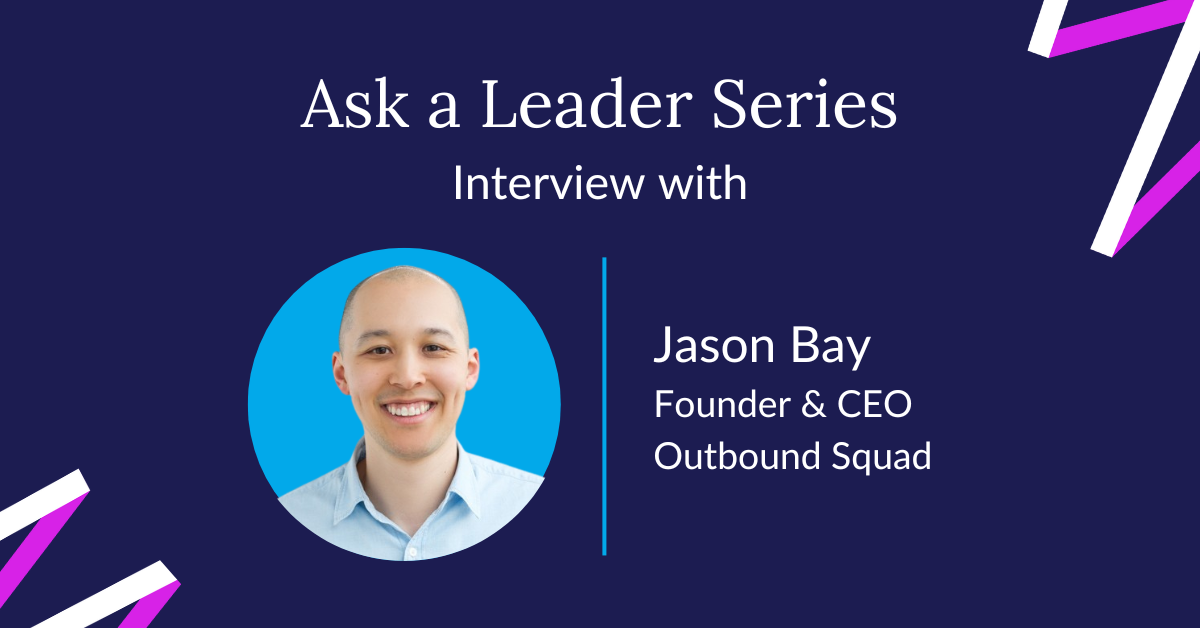Interview with Jason Bay, Founder and CEO at Outbound Squad
In this interview, Founder & CEO Jason Bay from Outbound Squad talks about coaching tips for SDRs and AEs, the importance of marketing and sales alignment, advice he’d give to aspiring sales leaders, two sales books he’d highly recommend, and an outbound sales mistake that makes him cringe.
1. What is THE top trend you're seeing in sales right now?
The number one coaching tip for SDRs and AEs is to create a culture of self-accountability. So as a sales leader, what's better than holding your reps accountable is having a culture where they hold themselves accountable.
What I recommend is having a good give-to-get policy when it comes to coaching. So in order to get coaching from you, a rep must attempt to coach themselves. If they want feedback on a cold call, they have to give themselves feedback on a cold call first and bring that to you. So create scorecards and self-accountability, and allow your reps to self-coach.
2. Why is it important for sales & marketing to collaborate?
On one side of the equation, as a marketer, you're creating content. And the type of content that you create for the prospect is really important based on where they're at in the buyer’s journey.
If you don't work together closely with sales, and then vice versa, the content that you're going to give a prospect who knows nothing about the problems that you solve, or that your solution even exists, that's a very different piece of content than someone who’s deciding between vendors, and deciding between your approach.
So the reason why it's super important is that from a content standpoint, if you want sales reps to use the content that you create, you need to collaborate with them and really understand what those one-to-one conversations are like.
3. What advice would you give to aspiring sales leaders?
The advice I would give to aspiring sales leaders is the same advice I was given as a first-time manager at 19: your biggest strengths will be your team's biggest weaknesses.
So what does that mean?
It means the stuff that comes naturally to you as a rep are going to be things that you don't think about teaching other people. So if you're really good at building rapport, or getting to pain, or multithreading and getting executives in, or whatever it might be. The things that are very obvious to you, I would really double down on focusing on teaching those to your team, because it's not going to be the first thing that you think of.
4. Are there books you'd highly recommend?
One that I recently read is called MEDDICC by Andy Whyte. And MEDDICC’s really great if you're doing any kind of sales, where you're closing deals that are over $10,000. And one of the hardest things to do when you're approaching sales calls is figuring out what you need to take away from the call in order to advance the deal forward. And a really great way to do that is through a qualification framework.
I'm not a huge fan of BANT, because it's so seller-centric. MEDDIC is something that aligns a little bit more with how a company might buy something. So I definitely recommend you check that out.
And the other one is Challenger Sale. So I think having a compelling point of view is really important these days. There are so many vendors out there selling the same product for the most part. And the differentiator is "commercial teaching," as they call it in that book. What can you teach this prospect about their competitors in the way that people are doing business right now, that would be a surprise to them and create an emotional reaction that's going to help you with prospecting or selling? So I'd recommend checking out those two books.
5. What is one outbound sales mistake that makes you cringe?
The biggest mistake ends up manifesting itself as really pitchy cold emails, for example. But I think at the core of that there's a lack of understanding of what we're actually trying to accomplish when we do outbound.
Outbound is not about looking for people to sell your solution to and to get sales calls with. Outbound is really looking for people whose priorities align with the priorities that you can help with. So if I sell sales training, for example, to a VP of sales, I'm not looking for good people to sell sales training to. I'm looking for VPs of sales whose priorities are getting their account executives to do more prospecting and increasing the business acumen of their SDR team so that they can land meetings with executives. Those are high-level priorities that these people have, that I can align with.
So that word “align” both from a selling and a prospecting standpoint, if you can think about ‘who can I find that aligns with the types of things that our clients care about, and have conversations with those people, those will naturally lead to conversations. So don't look for people to sell your stuff to; look for where there is alignment in priorities and problems that your solution can ultimately help with.
Check out our interview with Head of Sales Content Will Aitken to learn how to sell ice to a Canadian in winter.





